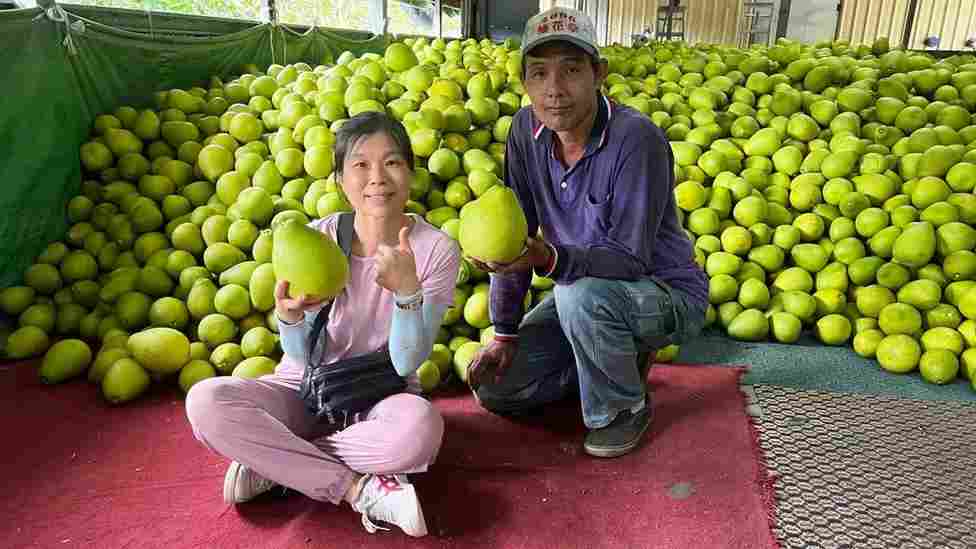The farmers caught up in Taiwan's tensions with China

Collected Image
"This year I was very cautious," he says. "I was especially afraid because the lack of rain and drought disrupted growth, and then political circumstances led China to cut off orders, so we can't sell our pomelos."
A pomelo is large citrus fruit that is similar to a grapefruit, but with a sweeter flavour. Back in early September the orchards around the small town of Ruisui on Taiwan's east coast were laden with the fruit.
The pomelos were due to be picked ahead of the Mid-Autumn Festival, which was celebrated in Taiwan and on mainland China this year on 10 September. This is a harvest festival slightly analogous to US Thanksgiving, and the fruit is traditionally eaten as part of the celebrations.
Yet this year Mr Wu, one of the local farmers, says that many of his neighbours gave up trying to sell their crop after a sharp drop in prices.
The background to this is that, while self-ruled Taiwan sees itself as distinct from the Chinese mainland, with its own democratically-elected government, Beijing sees the island as a breakaway province that will eventually be under its control.
Farmers in Ruisui usually export 70% of their pomelos to mainland China, so Mr Wu says the ban will make it difficult for everyone to cover costs such as fertilizer and labour.
"The month before the Mid-Autumn Festival, the market was already saturated, so when it was our turn to harvest pomelos in Ruisui it was too late as the price had already dropped," he adds. "This year's Chinese market ban came quickly, so it was too late to find a new market, and too late to react."
While Alicia Garcia Herrero, chief economist for Asia Pacific at investment bank Natixis, says that China's ban on Taiwanese pomelos is not a "big issue" for Taiwan, it has to be seen in the context of it being just one of many prohibitions that Beijing put in place last month.
In total, China blocked imports of more than 2,000 different Taiwanese food stuffs, from fish and seaweed, to cooking oils, cakes and other fruits. This followed after previous bans of Taiwanese pineapples, and both wax and sugar apples (tropical fruits that don't look or taste like apples).
Taken all together, it highlights the potentially precarious nature of Taiwan's economic relationship with the mainland.
A pomelo is large citrus fruit that is similar to a grapefruit, but with a sweeter flavour. Back in early September the orchards around the small town of Ruisui on Taiwan's east coast were laden with the fruit.
The pomelos were due to be picked ahead of the Mid-Autumn Festival, which was celebrated in Taiwan and on mainland China this year on 10 September. This is a harvest festival slightly analogous to US Thanksgiving, and the fruit is traditionally eaten as part of the celebrations.
Yet this year Mr Wu, one of the local farmers, says that many of his neighbours gave up trying to sell their crop after a sharp drop in prices.
The background to this is that, while self-ruled Taiwan sees itself as distinct from the Chinese mainland, with its own democratically-elected government, Beijing sees the island as a breakaway province that will eventually be under its control.
Farmers in Ruisui usually export 70% of their pomelos to mainland China, so Mr Wu says the ban will make it difficult for everyone to cover costs such as fertilizer and labour.
"The month before the Mid-Autumn Festival, the market was already saturated, so when it was our turn to harvest pomelos in Ruisui it was too late as the price had already dropped," he adds. "This year's Chinese market ban came quickly, so it was too late to find a new market, and too late to react."
While Alicia Garcia Herrero, chief economist for Asia Pacific at investment bank Natixis, says that China's ban on Taiwanese pomelos is not a "big issue" for Taiwan, it has to be seen in the context of it being just one of many prohibitions that Beijing put in place last month.
In total, China blocked imports of more than 2,000 different Taiwanese food stuffs, from fish and seaweed, to cooking oils, cakes and other fruits. This followed after previous bans of Taiwanese pineapples, and both wax and sugar apples (tropical fruits that don't look or taste like apples).
Taken all together, it highlights the potentially precarious nature of Taiwan's economic relationship with the mainland.
Source: https://www.bbc.com
Tags :
Previous Story
- China's jobless turn to car boot sales as...
- Chinese province plans ban on sale of gasoline...
- China factories ration power as heatwave sends demand...
- China blocks some Taiwan imports but avoids chip...
- Baidu self-driving car with detachable steering wheel likely...
- Chinese firm builds electric battery that enables 1,000-km...
- China Renaissance considers investments in high-growth Middle East...
- China manufacturing improves as virus curbs eased